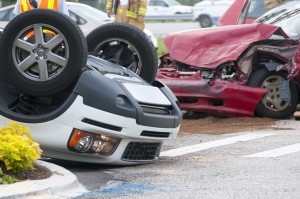 Uninsured / Underinsured Motorist (UM/UIM) insurance coverage exists to cover your damages when you are injured due to the negligence of another motorist who has little or no insurance. Whenever we meet with a new client who was injured in a car wreck, we review all the auto insurance policies in the household to determine what UM/UIM coverages may be available.
Uninsured / Underinsured Motorist (UM/UIM) insurance coverage exists to cover your damages when you are injured due to the negligence of another motorist who has little or no insurance. Whenever we meet with a new client who was injured in a car wreck, we review all the auto insurance policies in the household to determine what UM/UIM coverages may be available.
Sometimes that is a big deal. For example, we had a case recently in which the at-fault driver only had the minimum $25,000 liability coverage but out client had $50,000 excess UM/UIM coverage on five vehicles covered under separate stackable policies. That added $250,000 UM/UIM coverage to the $25,000 available from the at fault driver’s insurer.
But when I explain UM/UIM coverage to clients, they often express reluctance to make a claim against their own insurance company for damages caused by another driver. When I explain that is the purpose of UM/UIM coverage for which they have paid premiums, most folks can understand that.
For some people, fear of cancellation or premiums increases underlies reluctance to make a claim on their own policy. We are often asked, “How will making a claim for this accident affect my insurance rates?” The insurance industry has done a great job of scaring customers from using their insurance benefits, even though the insurance company cannot legally punish them for doing so by taking actions such as increasing premium rates.
In Georgia, O.C.G.A. § 33-9-40 provides that an insurer may not surcharge premiums or rates charged or cancel policies as result of insured’s involvement in multivehicle accident when the insured is not at fault. That statute clearly states: “No insurer shall surcharge the premium or rate charged on a policy of motor vehicle insurance or cancel such policy as a result of the insured person’s involvement in a multivehicle accident when such person was not at fault in such accident.”
But what about a risk that the insurance company would refuse to renew the insurance policy at the end of the policy period? O.C.G.A. § 33-23-45 deals with cancellation and nonrenewal of auto and motorcycle insurance policies. It is a long, detailed and convoluted statute. Among other things, it provides:
(C) With respect to any driver or with respect to any automobile or its replacement, except when the replacement is such that together with other relevant underwriting or eligibility rules it would not have been insured as an original policy risk of the insurer, for two or fewer of the following within the preceding 36 month period:
(i) Accidents involving two or more motor vehicles in which the driver of the insured automobile under this subparagraph was not at fault;
(ii) Uninsured or underinsured motorist coverage claims;
(iii) Comprehensive coverage claims; and
(iv) Towing or road service coverage claims.
The key number is two. If you have an accident that is not your fault and then make a UM/UIM claim for that accident, you are within the two events allowed under this code section. The insurance company cannot raise premiums, cancel coverage or refuse to renew your policy. Could an insurer refuse to renew if an insured make a UM/UIM claim for such an accident and also used his comprehensive or road service coverage? Apparently so. But if you use AAA for towing and the other driver’s liability property damage coverage instead of your own for car repairs, then there is risk of lawful nonrenewal based making a UM/UIM claim based on the accident for which you were not at fault.
If there is a notice of nonrenewal, the insured may within 15 days from receipt of the notice ask for a review by the Commissioner of Insurance.
If you have an accident for which you are not at fault, have used your comprehensive or road service coverages to get your own car towed and repaired, and then need to make a UM/UIM claim, you have options. One is to talk with your agent and determine whether the insurance company intends to raise premiums or non-renew your policy. If you can’t get a straight answer, then shop around for other coverage.
Perhaps someone in the legislature will see the wisdom of modifying this statute so that a single accident leading to UM/UIM, comprehensive and towing claims, could not trigger nonrenewal.
—————-
Ken Shigley is Certified Civil Trial Advocate of the National Board of Trial Advocacy, past president of the State Bar of Georgia (2011-12) and chair of the American Association for Justice Motor Vehicle Collision, Highway and Premises Liability Section.